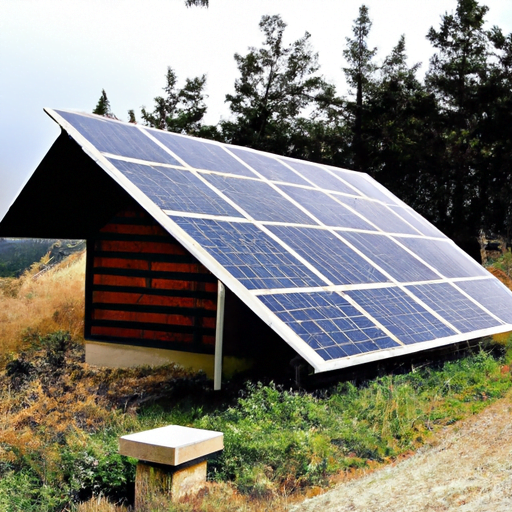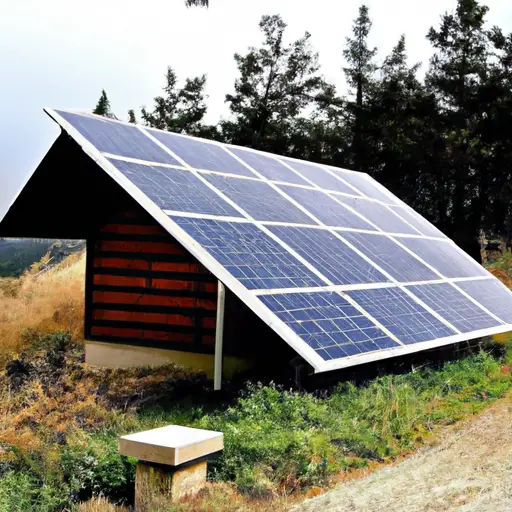So, have you ever thought about living off the grid? You know, no more relying on public utilities, no more paying those hefty electricity and water bills. Just you and nature, self-sufficient and independent. It’s a pretty enticing idea, isn’t it? Well, let’s dive into the world of off-grid living and explore what it’s all about.
Living off the grid means disconnecting from public utilities like electricity, water, and sewage systems. It’s about embracing a self-sufficient lifestyle, often powered by solar panels or wind turbines, collecting rainwater, and implementing composting toilets. It’s a way to reduce your carbon footprint and become more in tune with the environment. But is it as easy as it sounds? Can you just pack your bags and go off-grid?
Well, not exactly. Going off-grid requires careful planning and preparation. You’ll need to assess your energy needs, figure out how you’ll generate electricity, gather and store water, and manage waste. It’s a significant lifestyle change that demands a certain level of dedication and resourcefulness. But don’t worry, in our upcoming article, we’ll guide you through the steps and provide you with all the information you need to successfully embrace the off-grid lifestyle. Stay tuned! Many people today are considering the idea of going off-grid, disconnecting from the traditional power grid and living a more self-sufficient lifestyle. This decision comes with numerous benefits, including reduced dependency on utilities, lower living expenses, and environmental sustainability. If you are considering embracing the off-grid lifestyle, there are several factors to consider, such as choosing the right location, building a self-sufficient home, finding off-grid solutions for basic utilities, ensuring food security, and overcoming the challenges that may arise. By understanding and addressing these factors, you can establish a sustainable and fulfilling off-grid lifestyle.
One of the primary benefits of off-grid living is the reduced dependency on utilities. When you live off-grid, you are not reliant on external sources for your power, water, or waste management. This independence allows you to have control over your own resources, ensuring a constant supply even during outages or disruptions. Additionally, by generating your own electricity, utilizing renewable energy sources such as solar or wind power, you can reduce or even eliminate your monthly electricity bills. This can significantly lower your living expenses and provide long-term financial stability.
Moreover, off-grid living promotes environmental sustainability. By disconnecting from the traditional power grid, you reduce your carbon footprint and contribute to a cleaner, greener future. Utilizing renewable energy sources like solar panels or wind turbines allows you to harness the power of nature without depleting finite resources. Implementing sustainable water management practices such as rainwater harvesting or greywater recycling minimizes water wastage and protects this precious resource. Off-grid living encourages a more conscious and responsible approach to resource consumption, aligning with the urgent need to combat climate change.
Choosing the right location for your off-grid lifestyle is crucial. Before embarking on this journey, you must assess the availability of local resources. Consider factors such as access to timber for construction or firewood, the presence of water sources, and the potential for agriculture. You should also take into account climate and weather conditions in your chosen area. A location with ample sunlight and consistent wind can maximize the efficiency of your renewable energy systems. Additionally, proximity to essential services such as healthcare, schools, and markets must be considered to ensure a comfortable and sustainable lifestyle.
Building a self-sufficient home is a fundamental aspect of off-grid living. Designing your home to be energy-efficient and utilizing renewable energy sources is essential. Solar panels or wind turbines can generate electricity for your daily needs. Implementing energy-saving measures such as LED lighting and efficient appliances further reduces your energy consumption. Sustainable water management is equally important. Collecting rainwater for daily use and implementing filtration systems can provide a clean and reliable water supply. Incorporating composting toilets and recycling systems enables effective waste and sewage management, minimizing the impact on the environment.
Finding off-grid solutions for basic utilities is a significant consideration in establishing a self-sufficient lifestyle. Generating electricity through renewable energy sources is key, but it requires careful planning and investment. Assess your energy needs and choose a system that suits your requirements, whether it’s solar, wind, or a hybrid system. Implementing battery storage allows you to store excess energy for use during low production periods. Similarly, ensuring a clean water supply is vital. Installing water filtration systems or digging a well can provide a reliable source of clean drinking water. Managing waste and sewage can be achieved through composting toilets or septic systems, reducing the reliance on unsustainable infrastructure.
Food security is another important aspect to consider in off-grid living. Establishing a sustainable food source is essential for self-sufficiency. Embracing permaculture principles, such as intercropping, companion planting, and natural pest control, allows you to grow your own fruits, vegetables, and herbs. Creating a greenhouse or using innovative gardening techniques, like aquaponics or vertical gardening, can maximize your food production in limited spaces. Additionally, preserving and storing food through canning, drying, or fermenting ensures a continuous food supply throughout the year.
While the benefits of off-grid living are substantial, it is important to acknowledge the challenges and considerations that come with this lifestyle. Initial setup costs can be high, especially when investing in renewable energy systems and sustainable infrastructure. However, the long-term savings on utility bills can offset these initial expenses. Maintenance and troubleshooting may also require additional knowledge and skills, as you take on the responsibility of managing your own resources. Social isolation and limited connectivity can be challenging, particularly if you are used to the convenience of modern amenities and a bustling social life. However, embracing an off-grid lifestyle often leads to a stronger sense of community, as like-minded individuals come together to support and share knowledge with one another.
Living off-grid encourages a mindset of self-sufficiency and resilience. This lifestyle necessitates developing skills that promote self-reliance, such as gardening, carpentry, and basic repair and maintenance skills. Engaging in sustainable practices becomes a way of life, as you strive to reduce waste, conserve resources, and minimize your impact on the environment. Embracing an off-grid lifestyle can provide a sense of fulfillment and purpose, as you take control of your own life and become a steward of the earth.
Community building is also an important aspect of off-grid living. Forming like-minded communities allows for sharing of resources, knowledge, and experiences. Collaborative projects such as community gardens or renewable energy cooperatives can further enhance self-sufficiency and create a sense of belonging. Building strong and resilient communities is crucial, as they provide support, inspire creativity, and foster a sense of progress towards sustainable living.
Embracing an off-grid lifestyle not only benefits the individuals who choose this path but also contributes to a more sustainable future for our planet. By reducing our reliance on traditional utilities and embracing renewable energy sources, we can significantly reduce our carbon footprint. Off-grid living inspires others to adopt eco-friendly practices and promotes a cultural shift towards sustainability. Each individual who chooses this lifestyle becomes an advocate for change, working towards a greener and more harmonious existence.
In conclusion, embracing the off-grid lifestyle offers numerous benefits and the opportunity to live in harmony with nature. From reducing dependency on utilities and saving money to promoting environmental sustainability, off-grid living provides a pathway towards self-sufficiency and a more sustainable future. While it may come with challenges and considerations, the rewards of embracing this lifestyle extend beyond the individual, helping to foster communities and inspire others to adopt eco-friendly practices. So, if you are ready to take control of your own life, reduce your impact on the environment, and contribute to a more sustainable world, it’s time to embrace the off-grid lifestyle.





